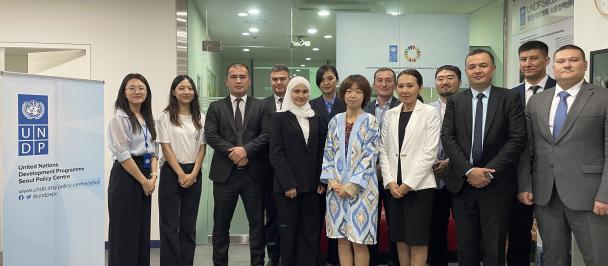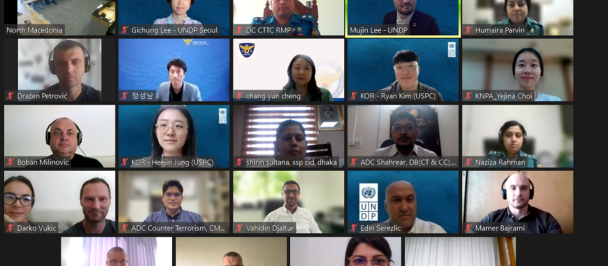Kyrgyzstan and Tajikistan delegations visit Korea to learn from its integrated support system for sexual and gender-based violence survivors
June 20, 2023

UNDP Seoul Policy Centre (USPC) hosted a study visit in partnership with UNDP Kyrgyzstan, UNDP Tajikistan, United Nations Office on Drugs and Crime (UNODC) Kyrgyzstan, and their respective government counterparts and state-authorized bodies to learn about Korea’s Sunflower Centers - one-stop service centres for sexual and gender-based violence (SGBV) survivors - from 30 to 31 May 2023. The visit was an integral component of USPC’s signature SDG Partnership programme, carried out with UNDP Kyrgyzstan to combat SGBV by enhancing police capacities and improving services provided by public institutions to support SGBV survivors. The participation from Tajikistan facilitated not only triangular knowledge exchanges with Korea, but also South-South Cooperation between Kyrgyzstan and Tajikistan.
Dr. Anne Juepner, USPC Director, and Ms. Gichung Lee, Policy Analyst at USPC, introduced the past and ongoing SDG partnerships to combat SGBV, and showcased the successful implementation of the Lilium Center and PPT Bunga Tanjung, Sunflower Center-inspired one-stop service centres in Albania and Indonesia, respectively. Ms. Lee expressed USPC’s commitment to supporting the establishment of similar centers in Kyrgyzstan and Tajikistan.
In terms of the current landscape and challenges in combating SGBV and establishing a one-stop service center in Kyrgyzstan, Ms. Ainura Asylbekova, Head of Bishkek City Medical Forensic Service highlighted a culture of stereotypical prejudice and victim blaming that led to underreporting of SGBV due to secondary victimization during investigative and legal processes. Lack of financial support for medical services, inconsistent legislation, and unsystematic procedures for supporting SGBV survivors are among the leading causes that prevent individuals from accessing necessary support services. As Kyrgyzstan is currently constructing a “One Window Center” within the Bishkek City Emergency Hospital, the study visit was a valuable opportunity to benchmark Korea’s best practices related to victim protection, investigation protocol, and integrated support services for SGBV survivors.
From Tajikistan, Ms. Gulchehra Ziyaeva, Project Manager of the UNDP Tajikistan Spotlight Initiative, complimented the Spotlight Initiative as critical in changing social norms and the patriarchal culture that impedes women’s agency and empowerment. However, challenges persist with the scattered nature of programs across the public and private sectors. Ms. Ziyaeva noted the absence of a legal basis for cross-organization cooperation which lead to referral issues between organizations that hinder women and girls’ access to services. Ms. Marhabo Naimzoda, Judge of the Supreme Court of the Republic of Tajikistan, presented the existing legal instruments that address SGBV and domestic violence experienced by women and girls, while raising the need for greater legal mechanisms to mitigate and prevent SGBV. Ongoing awareness raising campaigns and education on domestic violence, and proposed reforms in judicial and criminal law, are necessary to ensure confidentiality and protect victims from secondary victimization.
The first day concluded with a presentation by Ms. Hye Young Park, Former Associate Director of the Seoul Sunflower Center, and a visit to the Seoul Sunflower Center for Children. The first Sunflower Center in Korea was legally established under the Sexual Violence Prevention and Victims Protection Act in 2004 by the Ministry of Gender Equality and Family. Sunflower Centers are cross-institutional, integrative one-stop service mechanisms that provide counseling, psychological, medical, investigative, legal, accompaniment, and social welfare support in a single location for SGBV survivors. As of 2023, 39 Sunflower Centers operate nationwide.
The delegates enjoyed the opportunity to engage in an interactive discussion with Ms. Jae Sun Seo, Associate Director of the Center for Children. The child-oriented service center provides long-term and continuous psychological treatment for child and adolescent survivors of SGBV. Ms. Seo emphasized that receiving treatment is something SGBV survivors should neither be ashamed of nor hide in fear of repercussions. The Center continues the fight to eradicate discrimination and prevent secondary victimization of SGBV victims.
On the second day of the study visit, Ms. Yun-Cheng Chang, Senior Inspector of the Gyeonggi Bukbu Provincial Police Agency, presented on the role of the police in one-stop service centers. Ms. Chang explained the function of, and duties performed by police personnel in their investigation support for survivors of SGBV, domestic violence, prostitution, and child abuse. Ms. Chang emphasized victim investigation to be a crucial step within the investigation process as testimonial evidence is often the only source of evidence. Ms. Chang also highlighted the importance of victim-driven investigation methods that establish an enabling environment for victims not only to testify freely but also to secure probative power.

The delegation subsequently visited the Korean Women’s Development Institute (KWDI) to deepen their understanding of Sunflower Center’s monitoring and evaluation mechanism. Dr. Mijeong Lee, Senior Research Fellow at KWDI discussed the operational considerations for establishing Sunflower Centers, such as the quality of programs and the accessibility of services. The importance of human resource management, especially in terms of recruitment, retention, and training, was also highlighted in ensuring the smooth running of Sunflower Centers. Lastly, Dr. Lee advised on the importance of establishing regularly updated criteria through which Sunflower Centers continuously monitor and improve their practices to better support SGBV survivors.
To close the study visit, the delegates visited the Korea Women’s Hot Line (KWHL). Ms. Ranhee Song, Representative of KWHL, introduced the organization as a pioneering NGO with aims to make SGBV visible in the public domain and to nurture collective efforts to improve gender equality and address SGBV. To support SGBV survivors, the KWHL offers counseling services, access to shelters, and a hotline. In addition, KWHL engages in lawmaking and legislative processes to secure the involvement and responsibility of the government. Ms. Song outlined the organization’s awareness-raising activities, such as campaigns, public education and professional training, and cultural events on gender equality and tackling SGBV. The need for a paradigm shift on SGBV survivors as independent agents of self-empowerment rather than as passive recipients of protection was emphasized in closing.
This study visit was the first USPC-hosted, inter-agency study visit involving UNDP, UNODC and the EU-sponsored Spotlight Initiative to eliminate violence against women and girls. Through constructive feedback and knowledge exchange with Korean partners, the Kyrgyz and Tajik delegation reaffirmed their political will to establish and sustainably operate one-stop centres for gender-based violence survivors.
* UNDP Seoul Policy Centre (USPC) shares Korea’s tested-and-proven policy tools with other countries through SDG Partnerships. SDG Partnerships provide a combination of support, including partnership development with Korean institutions, seed funding, technical assistance, and policy advisory services. It utilizes UNDP’s global network of country offices and the policy expertise and know-how of partner organizations.

 Locations
Locations



